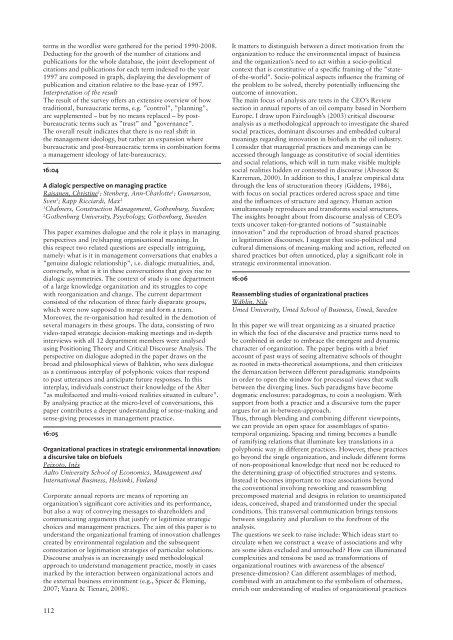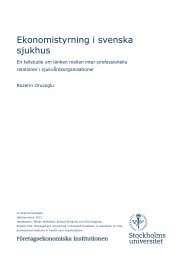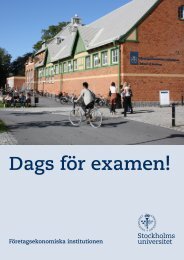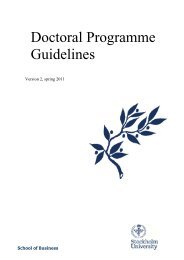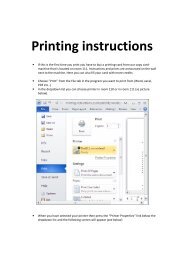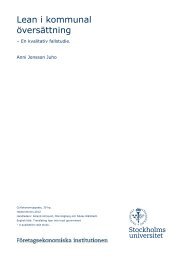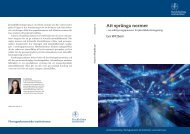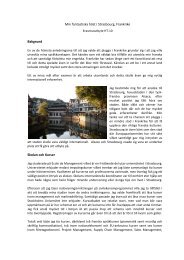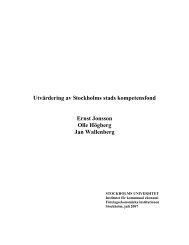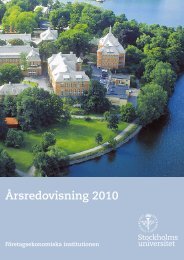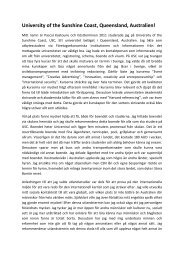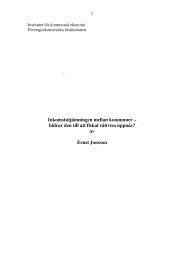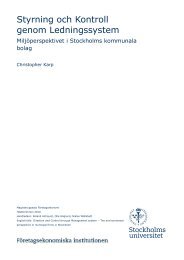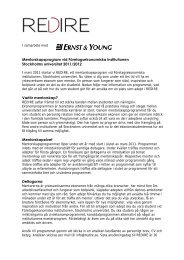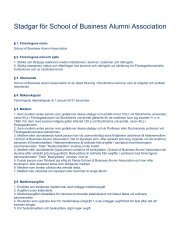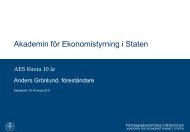Download full programme and abstract book pdf 1.6
Download full programme and abstract book pdf 1.6
Download full programme and abstract book pdf 1.6
Create successful ePaper yourself
Turn your PDF publications into a flip-book with our unique Google optimized e-Paper software.
terms in the wordlist were gathered for the period 1990-2008.<br />
Deducting for the growth of the number of citations <strong>and</strong><br />
publications for the whole database, the joint development of<br />
citations <strong>and</strong> publications for each term indexed to the year<br />
1997 are composed in graph, displaying the development of<br />
publication <strong>and</strong> citation relative to the base-year of 1997.<br />
Interpretation of the result<br />
The result of the survey offers an extensive overview of how<br />
traditional, bureaucratic terms, e.g. ”control”, ”planning”,<br />
are supplemented – but by no means replaced – by postbureaucratic<br />
terms such as ”trust” <strong>and</strong> ”governance”.<br />
The overall result indicates that there is no real shift in<br />
the management ideology, but rather an expansion where<br />
bureaucratic <strong>and</strong> post-bureaucratic terms in combination forms<br />
a management ideology of late-bureaucracy.<br />
16:04<br />
A dialogic perspective on managing practice<br />
Raisanen, Christine 1 ; Stenberg, Ann-Charlotte 1 ; Gunnarson,<br />
Sven 1 ; Rapp Ricciardi, Max 2<br />
1 Chalmers, Construction Management, Gothenburg, Sweden;<br />
2 Gothenburg University, Psychology, Gothenburg, Sweden<br />
This paper examines dialogue <strong>and</strong> the role it plays in managing<br />
perspectives <strong>and</strong> (re)shaping organisational meaning. In<br />
this respect two related questions are especially intriguing,<br />
namely: what is it in management conversations that enables a<br />
”genuine dialogic relationship”, i.e. dialogic mutualities, <strong>and</strong>,<br />
conversely, what is it in these conversations that gives rise to<br />
dialogic asymmetries. The context of study is one department<br />
of a large knowledge organization <strong>and</strong> its struggles to cope<br />
with reorganization <strong>and</strong> change. The current department<br />
consisted of the relocation of three fairly disparate groups,<br />
which were now supposed to merge <strong>and</strong> form a team.<br />
Moreover, the re-organisation had resulted in the demotion of<br />
several managers in these groups. The data, consisting of two<br />
video-taped strategic decision-making meetings <strong>and</strong> in-depth<br />
interviews with all 12 department members were analysed<br />
using Positioning Theory <strong>and</strong> Critical Discourse Analysis. The<br />
perspective on dialogue adopted in the paper draws on the<br />
broad <strong>and</strong> philosophical views of Bahktin, who sees dialogue<br />
as a continuous interplay of polyphonic voices that respond<br />
to past utterances <strong>and</strong> anticipate future responses. In this<br />
interplay, individuals construct their knowledge of the Alter<br />
”as multifaceted <strong>and</strong> multi-voiced realities situated in culture”.<br />
By analysing practice at the micro-level of conversations, this<br />
paper contributes a deeper underst<strong>and</strong>ing of sense-making <strong>and</strong><br />
sense-giving processes in management practice.<br />
16:05<br />
Organizational practices in strategic environmental innovation:<br />
a discursive take on biofuels<br />
Peixoto, Inês<br />
Aalto University School of Economics, Management <strong>and</strong><br />
International Business, Helsinki, Finl<strong>and</strong><br />
Corporate annual reports are means of reporting an<br />
organization’s significant core activities <strong>and</strong> its performance,<br />
but also a way of conveying messages to shareholders <strong>and</strong><br />
communicating arguments that justify or legitimize strategic<br />
choices <strong>and</strong> management practices. The aim of this paper is to<br />
underst<strong>and</strong> the organizational framing of innovation challenges<br />
created by environmental regulation <strong>and</strong> the subsequent<br />
contestation or legitimation strategies of particular solutions.<br />
Discourse analysis is an increasingly used methodological<br />
approach to underst<strong>and</strong> management practice, mostly in cases<br />
marked by the interaction between organizational actors <strong>and</strong><br />
the external business environment (e.g., Spicer & Fleming,<br />
2007; Vaara & Tienari, 2008).<br />
112<br />
It matters to distinguish between a direct motivation from the<br />
organization to reduce the environmental impact of business<br />
<strong>and</strong> the organization’s need to act within a socio-political<br />
context that is constitutive of a specific framing of the ”stateof-the-world”.<br />
Socio-political aspects influence the framing of<br />
the problem to be solved, thereby potentially influencing the<br />
outcome of innovation.<br />
The main focus of analysis are texts in the CEO’s Review<br />
section in annual reports of an oil company based in Northern<br />
Europe. I draw upon Fairclough’s (2003) critical discourse<br />
analysis as a methodological approach to investigate the shared<br />
social practices, dominant discourses <strong>and</strong> embedded cultural<br />
meanings regarding innovation in biofuels in the oil industry.<br />
I consider that managerial practices <strong>and</strong> meanings can be<br />
accessed through language as constitutive of social identities<br />
<strong>and</strong> social relations, which will in turn make visible multiple<br />
social realities hidden or contested in discourse (Alvesson &<br />
Karreman, 2000). In addition to this, I analyze empirical data<br />
through the lens of structuration theory (Giddens, 1986),<br />
with focus on social practices ordered across space <strong>and</strong> time<br />
<strong>and</strong> the influences of structure <strong>and</strong> agency. Human action<br />
simultaneously reproduces <strong>and</strong> transforms social structures.<br />
The insights brought about from discourse analysis of CEO’s<br />
texts uncover taken-for-granted notions of ”sustainable<br />
innovation” <strong>and</strong> the reproduction of broad shared practices<br />
in legitimation discourses. I suggest that socio-political <strong>and</strong><br />
cultural dimensions of meaning-making <strong>and</strong> action, reflected on<br />
shared practices but often unnoticed, play a significant role in<br />
strategic environmental innovation.<br />
16:06<br />
Reassembling studies of organizational practices<br />
Wåhlin, Nils<br />
Umeå University, Umeå School of Business, Umeå, Sweden<br />
In this paper we will treat organizing as a situated practice<br />
in which the foci of the discursive <strong>and</strong> practice turns need to<br />
be combined in order to embrace the emergent <strong>and</strong> dynamic<br />
character of organization. The paper begins with a brief<br />
account of past ways of seeing alternative schools of thought<br />
as rooted in meta-theoretical assumptions, <strong>and</strong> then criticizes<br />
the demarcation between different paradigmatic st<strong>and</strong>points<br />
in order to open the window for processual views that walk<br />
between the diverging lines. Such paradigms have become<br />
dogmatic enclosures: paradogmas, to coin a neologism. With<br />
support from both a practice <strong>and</strong> a discursive turn the paper<br />
argues for an in-between-approach.<br />
Thus, through blending <strong>and</strong> combining different viewpoints,<br />
we can provide an open space for assemblages of spatiotemporal<br />
organizing. Spacing <strong>and</strong> timing becomes a bundle<br />
of ramifying relations that illuminate key translations in a<br />
polyphonic way in different practices. However, these practices<br />
go beyond the single organization, <strong>and</strong> include different forms<br />
of non-propositional knowledge that need not be reduced to<br />
the determining grasp of objectified structures <strong>and</strong> systems.<br />
Instead it becomes important to trace associations beyond<br />
the conventional involving reworking <strong>and</strong> reassembling<br />
precomposed material <strong>and</strong> designs in relation to unanticipated<br />
ideas, conceived, shaped <strong>and</strong> transformed under the special<br />
conditions. This transversal communication brings tensions<br />
between singularity <strong>and</strong> pluralism to the forefront of the<br />
analysis.<br />
The questions we seek to raise include: Which ideas start to<br />
circulate when we construct a weave of associations <strong>and</strong> why<br />
are some ideas excluded <strong>and</strong> untouched? How can illuminated<br />
complexities <strong>and</strong> tensions be used as transformations of<br />
organizational routines with awareness of the absence/<br />
presence-dimension? Can different assemblages of method,<br />
combined with an attachment to the symbolism of otherness,<br />
enrich our underst<strong>and</strong>ing of studies of organizational practices


